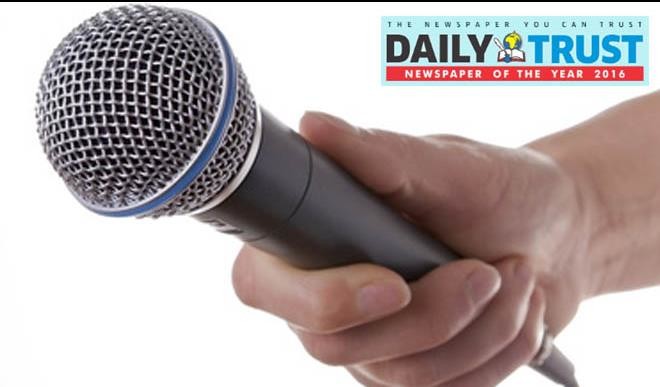Press freedom, the right to report news or circulate opinions without censorship from the government has come under questioning in Nigeria following the recent plan by the National Assembly to pass a bill to censor the media. Also, the recent announcement by NBC concerning airing some reports has come under scrutiny. Daily Trust Saturday samples the opinions of some media practitioners.
Felix Khanoba, 36, journalist, Abuja
A free press has to do with a system that allows journalists and other media practitioners to report stories or events freely without any fear of being harassed, arrested or intimidated either by state or non-state actors as a result of the reportage.
A free press also connotes the ability of media practitioners to express any opinion they want, even if it has to do with criticising the government’s actions and inactions.
The recent National Broadcasting Commission’s (NBC’s) directive to television and radio stations not to report attacks by terrorists in detail as well as the recent ‘anti-media bill’ in the National Assembly negates the principle of a free press.
- Insecurity: 113 traditional rulers kidnapped in 4 years
- How I moved from royal stool to study law – Monarch
Nurudeen Akinwale, 44, journalist, Abuja
Free press means the rights of journalists to report news, events and perform their duties without hindrance by the authorities. It means that the government should create an atmosphere that does not stifle the freedom of the press and shrink the civic space where citizens can also vent their views and opinions on issues affecting their well-being and the country as a whole.
Media should be free from government or political censorship while journalists should not be targets of attacks for doing what the constitution assigned them to do.
Paul Jatau, 57, journalists, Jos
Having a free press is a fundamental human right. Without a free press, society can hardly function optimally. Any society that aspires to grow must have a free and open press.
We must, therefore, work to ensure that people are allowed to speak out whenever their rights are trampled upon. Airing one’s views allow for alternative views.
Philip Clement, 29, journalist, Abuja
Press Freedom refers to the ability of the media to exercise their constitutional duties without external interference.
It is very important in every society as the primary responsibility of the press is to hold the government accountable to the people without fear or favour.
As such, the press is expected at all times both in developed and developing countries to be neutral and non-partisan in reporting events, issues and developments that affect growth and development in the Society.
Abdulkhaliq Aliyu, 25, journalist, Kano
The press as the fourth estate of the realm in a democracy can only and truly be effective when it’s free. For a society to develop, its press must be free to perform its watchdog functions, whereby, the publisher has exclusive control over what to publish without any form of interface, especially on matters of public interest.
Democracy, human rights and societal developments cannot advance without freedom of the press. Therefore, laws that restrict journalists from carrying out their duties need to be expunged and replaced with those that safeguard their safety.
However, journalists need to do their jobs by adhering to the highest professional and ethical standards like being objective, socially responsible and not taking gratification in order to gain trust.
Yemi Kosoko, 59, journalist, Jos
A free press is expected to be subjected to reporting and covering events without interference, coercion or any form of hindrance that would jeopardise the ethical conduct of the profession.
As a media practitioner, I strongly believe that a free press should also be regulated in accordance with the laws of the land by an independent body devoid of government regulation of the media. This regulatory body should comprise professional bodies, including the NUJ, Guild of Editors and NPAN as well as government representatives for the task of regulation which will complement the professional ethics as spelt out in the journalists’ code of ethics.
Above all, a free press should be able to be the voice to the voiceless as well as bringing government to accountability.
Isah Isma’ila, 27, journalist, Abuja
For every professional media practitioner freedom of the press is key to allowing him to discharge his constitutional responsibilities as contained in Section 22 of the 1999 constitution.
However, freedom of the press is a bulwark of liberty that allows a professional journalist to report the news without censorship from the government.
There is a need for countries around the world and Nigeria precisely to shun all forms of censorship on the media to allow them to serve as watchdogs for the good of their countries.
Habeeb Ishaq Abubakar, 29, journalist, Kano
Free press to media practitioners means the freedom to seek, obtain, organize, edit and disseminate information for the consumption of the general public in the interest of justice, fairness, equity, public awareness, etc., in line with the provisions of the laws of the federal republic of Nigeria. But that is putting it simply.
Press freedom cuts deeper in meaning to other media practitioners, where they perceive it to mean; holding the government accountable for their public deeds, being the eagle eye of the society and the gatekeepers against oppression and high-handedness by public office holders among other things.
Moreover, on the not-so-bright side, some unethical media practitioners see a free press as an avenue to misinform the public, disrupt public order through unethical journalistic practices, hate speech and whatnot, collecting brown envelopes offered to trade professionalism for cartel journalism.
Adamu Yusuf, journalist, Kaduna
A free press is a freedom given to journalists to report any issue without being intimidated. Free press means the right of journalists or media organizations to report events and happenings in society without interference.
The media law and ethics give guidelines on how press freedom should be implemented by professionals.
A free press also entails that the media respect its corporate social responsibility. A free press also comes with limitations because journalists are not hundred per cent free. We have our limitations because any story that can bring disunity or crisis shouldn’t be used.
Uangbaoje, publisher, Kaduna
There is nothing like free press as far as I am concerned. Free press to me is supposed to be my right as a journalist to gather, process, and disseminate information based on facts, without control or interference from either the government or anybody.
But today in Nigeria, journalists are harassed, detained, tortured, and killed for doing their job. Now they are trying to enact a law to further tighten the noose and subject media practitioners to their control.
Shabul Mazadu, 51, newspaper Publisher, Jos
Free press or media freedom is the act of journalism practice with no impediments, duress or subjection emanating from external force or self-infliction due to inducement and sentiments of whatever kind.
A free press particularly grants the media practitioners the leverage to discharge their duties of invading the camp of those who, by their words or deeds, ensconce the continued existence of disparaging distinctions and inequalities among human beings with ease and without fear or favour.
Every citizen of Nigeria has the right to every detailed information about their country and to express themselves within the ambit of legality. This can only be achieved through freedom of the press.
Gloria Thomas, media practitioner, Jos
A free press to me means that citizens and the media are able to express themselves without fear of intimidation, censorship, violence or threats of incarceration. People are able to speak without hindrances while the media communicate information to the public in a fearless manner respecting the ethics of the profession.
A free press stands for the truth, speaks for the citizens fairly and objectively, protects the vulnerable, highlights challenges and proffer solutions, seeks justice for the oppressed and sees that the rights of all are upheld.
A free press sets the agenda as it provides everyone with the platform to listen, read and be heard.
Tony Ita, 50, journalist, Uyo
A free press is creating an environment where the media can investigate, report or write freely as the situation or condition is without any form of harassment, threat or intimidation by the government or its agents. It is when the media has unhindered access to information, It is the strict implementation or adherence to the Freedom of Information Act to guarantee a free press in Nigeria.
Chidimma C. Okeke(Abuja), Usman Bello Balarabe(Kano), Abdulkadir Shehu(Kaduna), Dickson S. Adama(Jos) & Iniabasi Umo(Uyo)

 Join Daily Trust WhatsApp Community For Quick Access To News and Happenings Around You.
Join Daily Trust WhatsApp Community For Quick Access To News and Happenings Around You.


